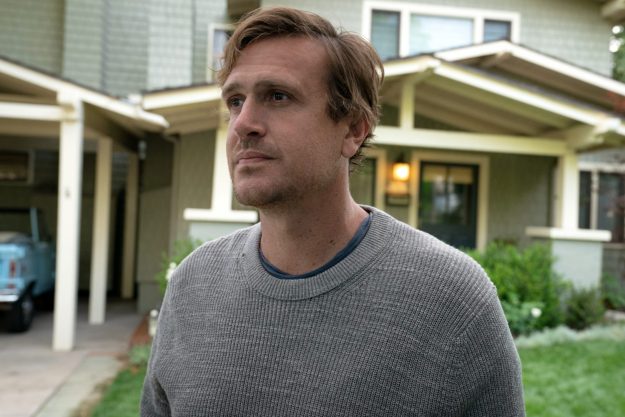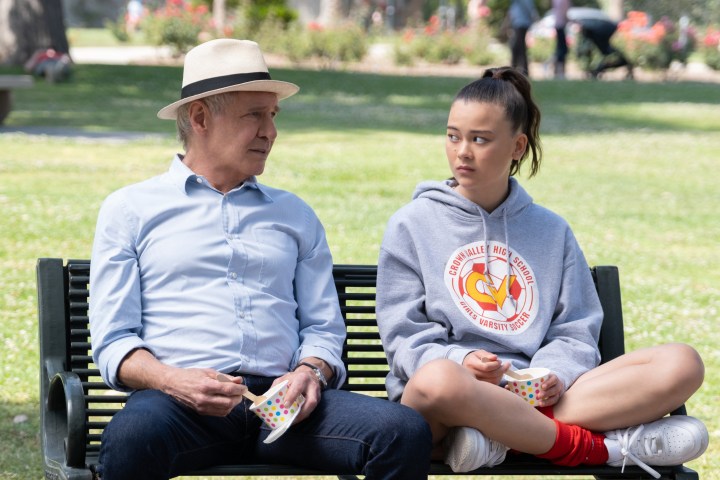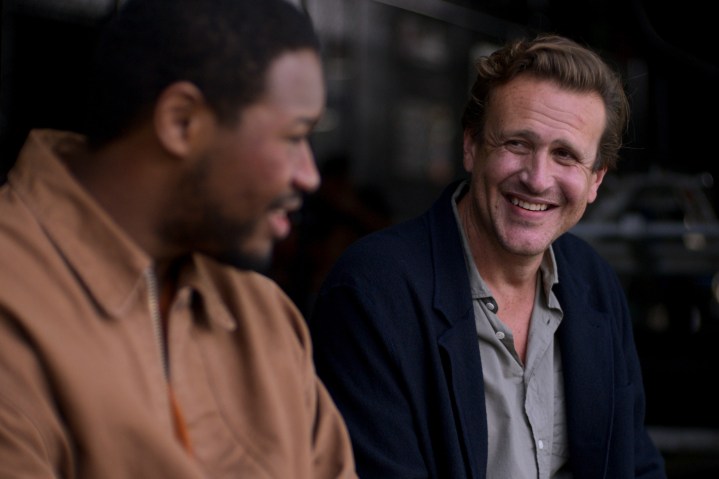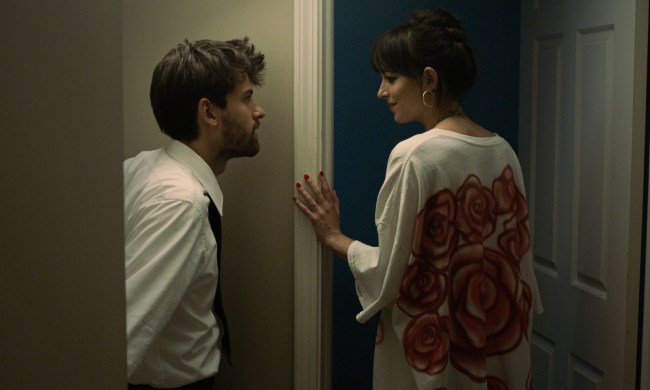
“Shrinking is another earnest and infectiously sincere dramedy series from several of the writers and producers behind Ted Lasso.”
- An impressive ensemble cast
- Harrison Ford's standout supporting performance
- An earnest approach that allows for moments of both comedy and heartbreak
- Several uneven early episodes
- An occasionally grating protagonist
- Several characters take a few episodes to become fully realized
Shrinking is a messy, absurd, and occasionally moving comedy about a group of messy, absurd, and occasionally insightful people. It is, in other words, the natural result of a creative collaboration between Ted Lasso co-creator Bill Lawrence, Ted Lasso star and writer Brett Goldstein, and Jason Segel. Across its first nine episodes, the Apple TV+ series runs headfirst into the difficult emotional terrain of its story with the same playful spirit that has, for better or worse, come to define many of Lawrence’s previous TV efforts, including Scrubs, Cougar Town, and yes, Ted Lasso.
Shrinking does not, however, emerge quite as fully formed in its first episode as Lawrence and Goldstein’s other Apple TV+ hit. The series, which premieres this week, struggles at first with its characterizations and treatment of certain characters. Shrinking‘s initial attempts to balance comedy and heartbreak aren’t always successful, either. However, there are moments of brilliance scattered throughout Shrinking’s uneven initial episodes, and it doesn’t take long for the series to start to emerge as the first truly great ensemble TV comedy of the year.

At the center of the series’ ensemble is Jimmy (Segel), a once-capable therapist who was sent into an intense emotional spiral by the death of his wife, Tia. By the time Shrinking begins, Jimmy’s self-destructive coping methods have become so repetitive that his next-door neighbor, Liz (Christa Miller), reacts to him partying loudly in his backyard at 3 a.m. with the same tone of parental disappointment she would if she’d just caught one of her sons breaking curfew. As has been the case with many of his past characters, Segel makes the most out of Jimmy’s shortcomings by bringing the same commitment to the character’s moments of self-pity as he does his often cartoonish outbursts.
Shrinking’s messy premiere episode follows Jimmy as he decides to finally break out of his own cycle of drugs and general cynicism. Unfortunately for everyone in his life, Jimmy determines that the best way for him to do so is not only to start telling all of his patients what he thinks about them, but also to become unethically entangled in their lives. Shrinking, to its credit, doesn’t ever reward Jimmy for this decision, and the series never acts as though his sudden shift in strategy is anything other than yet another attempt on his part to avoid dealing with his own crippling grief.
Jimmy’s numerous off-screen mistakes have inevitably had an effect on those around him. His daughter, Alice (Lukita Maxwell), has been so thoroughly abandoned by her father in the year since her mom’s death that she’s essentially turned to Miller’s Liz to provide the parental supervision Jimmy hasn’t. Alice’s presence in her life has, in turn, only exacerbated Liz’s struggles with her own form of Empty Nest Syndrome, while Jimmy’s former best friend, Brian (Michael Urie), has been left wondering what he did to make Jimmy decide to unceremoniously cut him off.

At work, Jimmy’s colleague, Gaby (Jessica Williams), has resorted to ignoring the emotional baggage of her forthcoming, unavoidable divorce. Jimmy’s mentor and boss, Paul (Harrison Ford), meanwhile, has already been diagnosed with Parkinson’s disease by the time Shrinking’s premiere begins. Despite his best efforts at presenting himself as Shrinking’s unflinching elder statesman, Paul’s diagnosis has similarly forced him to begin revisiting his estranged relationship with his daughter, Meg (Lily Rabe), in the hopes that he might be able to make up for some of his past mistakes.
If this sounds like a lot of emotional turmoil for Shrinking to try and sift through, that’s because it is. The series doesn’t always balance its multiple subplots as satisfyingly as it should, either. However, there’s an openheartedness to the way in which Shrinking treats its characters and their problems that not only makes the series all the more endearing, but also prevents it from ever wallowing in darkness or heartbreak for too long. Whenever Segel’s Jimmy seems like he’s entered an unstoppable descent into total misery, someone like Williams’ Gaby, Ford’s Paul, or Miller’s Liz shows up again to bust his chops and lift both him and Shrinking back up.
However, the series does struggle to figure out the roles of several characters in its early episodes. Miller’s Liz initially oscillates between being a parental adversary for Jimmy and the butt of every other character’s jokes, and there are moments where Shrinking seems unsure of how to fully integrate Williams’ Gaby into its multiple stories. Both of those problems are solved when Gaby and Liz become friends around halfway through Shrinking’s first season, which allows both Williams and Miller to establish a comedic dynamic together that is among the show’s best. The formation of Gaby and Liz’s friendship also marks the moment when Shrinking begins to operate less like a dysfunctional workplace series and more like a laid-back hangout comedy.

Shrinking’s midseason shift proves to be mostly for the better. While its transition toward a looser narrative structure does result in its central premise — Jimmy’s reckless new therapy tactics — essentially falling by the wayside, the adoption of a more leisurely pace gives Shrinking the chance to become a true ensemble comedy. Stars like Williams, Miller, and Urie all find their groove in the second half of Shrinking’s first season, and the series, in turn, finally seems to nail down its depiction of their characters around the same time. Jimmy’s grief also, paradoxically, seems to manifest itself in more nuanced ways the less that Shrinking focuses on it.
Across Shrinking’s first nine episodes, though, it’s Harrison Ford’s Paul who makes the biggest and most memorable impression. The actor turns out to be perfectly cast as Jimmy’s wise but withholding superior, one whose empathy for his protégé’s situation is expressed through the private therapy sessions he conducts with Maxwell’s Alice. Here, Ford is just as gruff and sarcastic as ever, but he’s also allowed to be silly and heartfelt in ways that he’s rarely been given the chance to be on-screen before. Shrinking is arguably worth investing in just for the episode in which Ford’s Paul gets accidentally stoned and ends up munching on a bag of Doritos with Miller’s Liz.
Ford’s performance rings with the same level of sincerity that permeates all of Shrinking. The series is an ambitious and emotionally resonant dramedy that isn’t afraid to let its characters be as messy as possible. At times, that messiness can extend past Shrinking’s characters and into the show itself, but those instances are ultimately few and far between. By the time the series has reached its layered, emotionally complicated ninth episode, Shrinking has already earned its place as one of the more impressive ensemble comedies that have premiered in recent months.
At its best, the series is able to do what all great TV dramedies should, which is smoothly shift between moments of comfort, heartbreak, and humor all within the span of a few seconds. The fact that it’s able to do so is not only a testament to the strength of Shrinking’s creative team, but also the collective talent of its undeniably impressive, lovable cast.
Shrinking premieres Friday, January 27 on Apple TV+. Digital Trends was given early access to the first nine of the season 1’s 10 episodes.



